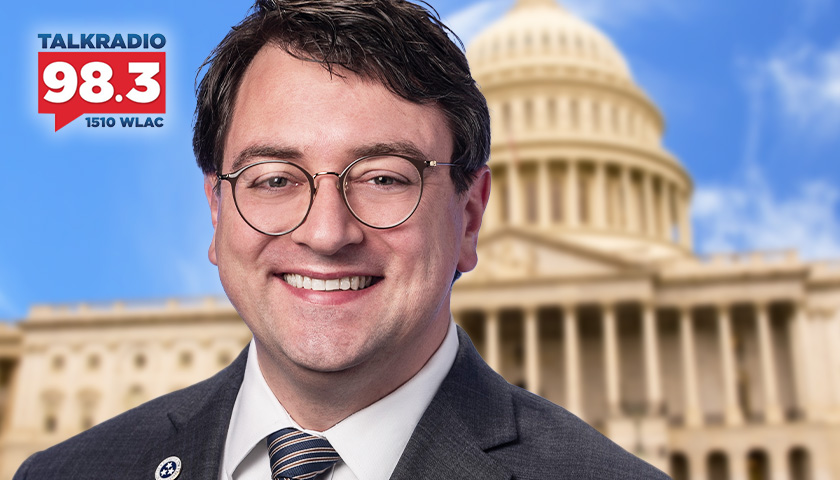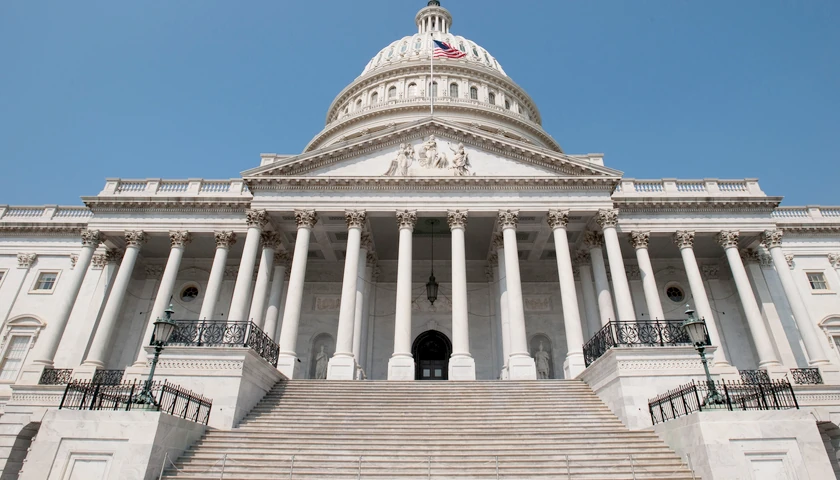Live from Music Row, Monday morning on The Tennessee Star Report with Michael Patrick Leahy – broadcast on Nashville’s Talk Radio 98.3 and 1510 WLAC weekdays from 5:00 a.m. to 8:00 a.m. – host Leahy welcomed Tennessee AG Jonathan Skrmetti in-studio to comment upon ESG’s backdoor social policy-pushing and the origins and purpose of the National Association of Attorneys General.
Leahy: We continue our in-the-studio discussion with Tennessee Attorney General Jonathan Skrmetti. Also in-studio Braden Boucek with the Southeastern Legal Foundation, and Crom Carmichael, the original all-star panelist. General Skrmetti – that’s the way we should address you, right? General Skrmetti.
Skrmetti: I’m told that is correct now, yes.
Leahy: General Skrmetti. Okay, so there’s something that’s been really bugging me about America, and it’s this concentration of power in these big, huge funds that own stock in every Fortune 500 company.
And this guy who runs one of the biggest ones, BlackRock – the aptly named Larry Fink, that guy – he’s a Lefty. He’s a far-left guy. And he came up with the idea of ESG. Tell us what ESG stands for.
Skrmetti: So, ESG stands for environmental, social, and governance. And the broad idea here is you’ve got people with a lot of market power, and it started out in the financial sector. I think you’ve seen it spread to other big industries where the folks in boardrooms have decided they know what’s best for the world, and they’re going to use their market power, which gives them incredible amounts of leverage to try to push society in the directions they want.
And it’s just straight-up oligarchy. We have a constitutional republic. We have a representative democracy. Any time we’re going to see new rules apply to society, they have to go through established political processes that are designed to give everybody a voice.
And nobody’s naive about it. We understand there are people who, by virtue of their fortune, by virtue of their platform, and of their celebrity, are going to have some sort of outsized influence in that process. But at the end of the day, everybody has a vote.
And the system is predicated on everybody having that vote and everybody having an equal opportunity to participate. When you’re talking about ESG, you’re talking about people who are trying to back-door policy decisions through their market position. And usually, it’s not just one big company.
You get one company that’ll start the ball rolling, but then they’ll get other people in the same sector involved. And pretty soon you’re talking about a huge percentage of, say, the tech industry, or of the financial industry, pushing in one direction.
And this is just a fundamental governance issue. I recognize that people are very concerned about certain issues. The environment obviously has people who are devoting every waking moment to thinking about and worrying about it.
There are people who make climate change the center of their existence. And this is America. It’s a free country. They’re allowed to do that. But once you start talking about big companies working together to push in a particular direction, you’re talking about potential antitrust problems, you’re talking about potential consumer protection issues in terms of the disclosures that are made.
If you invest with a financial company, you’re expecting them to try to get you the best return, not to use your money as leverage to try to get their social outcomes, and antitrust and consumer protection are the heartland of state attorneys general.
And so I think it’s important that we here in Tennessee and that AGs elsewhere in the country work together to ensure that we are governed by our democratic institutions, that there aren’t opportunities to circumvent that through a concentration of wealth.
And you’ve seen a little bit of that, and I can tease that this week you’re going to see a little bit more. The Republican AGs have been talking about this. We’re very concerned about these issues, and we recognize that we are uniquely positioned to push back.
And this is just profoundly fundamental. We need a country that is run by its elected officials. I know it’s messy. I know they make everybody mad from time to time. There’s not one person, no matter where they are on the ideological spectrum, that’s happy about every outcome they get from our political branches.
But that’s the way it’s supposed to be. And this idea of fixing the system by taking money and just pushing hard to make everything better, it’s antithetical to what’s American.
Leahy: So, you gave us a little hint there. There will be something coming this week from your office that addresses the issue of the out-of-control ESG agenda of the Lefties who run the big hedge funds like BlackRock, Larry Fink, et cetera. And the hint there that I heard, it has something to do with consumer protection and antitrust.
Skrmetti: Correct.
Leahy: All right, we’ll wait. Can you tell us any more? We’ll see tomorrow.
Skrmetti: You’ll see tomorrow. (Leahy chuckles) But, yes, we’ve been working on this. This is a high priority.
Leahy: You said something else that is very interesting. Republican attorneys general around the country, there are how many – 25, 26, 27 of them?
Skrmetti: I think it’s 27.
Leahy: Twenty-seven, okay. And it looks like the attorneys general in the red states are in direct opposition to the attorneys general in the blue states. Now, for some time, they’ve all been together in the National Associations of Attorneys General.
There’s a little bit of, oh, I don’t know – I’ll call it my words, not yours – skullduggery going on there with some money. There was an article in The Wall Street Journal about this recently.
Skrmetti: NAG, the National Association …
Leahy: We’ve got some good names here. Larry Fink, right? And NAG, these are the bad guys.
Skrmetti: NAG is a really unfortunate acronym. So it goes back to 1907, it started when the AG started working together against Standard Oil, which was another time when you had big concentrations of capital having undue influence on America.
And it’s a functional bipartisan institution in many respects. So for the big tech-push that we’ve made, there’s been a lot of productive bipartisan conversation, but there is a lot of money in NAG. There’s about $280 million.
Leahy: Where did that come from?
Skrmetti: Most of it has come from various settlements. The bulk of it came from the tobacco settlement, and that got the ball rolling.
And then there were a number of instances where other settlement monies were put in, and then they created this system of, basically, rolling grants, where multi-state efforts could get money from these funds with a promise to pay the money back when they successfully completed the multi-state and recovered money as part of that.
There are just some structural problems there. I think that NAG is a worthwhile institution. And I think for cases like our social media investigation that’s going on right now, for some of the tech antitrust cases that are centered in NAG, it’s a useful vehicle to get everybody on the same page when they need to get on the same page.
That said, there has to be a solid focus on transparency and on guardrails, and we need to make sure that every AG is participating. We need to make sure that the institution hasn’t been captured and that the staff is not all moving in one direction.
Because we’ve got a majority of state AGs that are Republicans and they are conservatives. And you have this disconnect between an institution that’s gotten increasingly comfortable in the D.C. ecosystem and increasingly comfortable working in this multi-state space, where there are other players who just have very different incentives, right? The trial bar is a problem in many respects to what the AGs are trying to do.
Listen to today’s show highlights, including this interview:
– – –
Tune in weekdays from 5:00 – 8:00 a.m. to The Tennessee Star Report with Michael Patrick Leahy on Talk Radio 98.3 FM WLAC 1510. Listen online at iHeart Radio.





